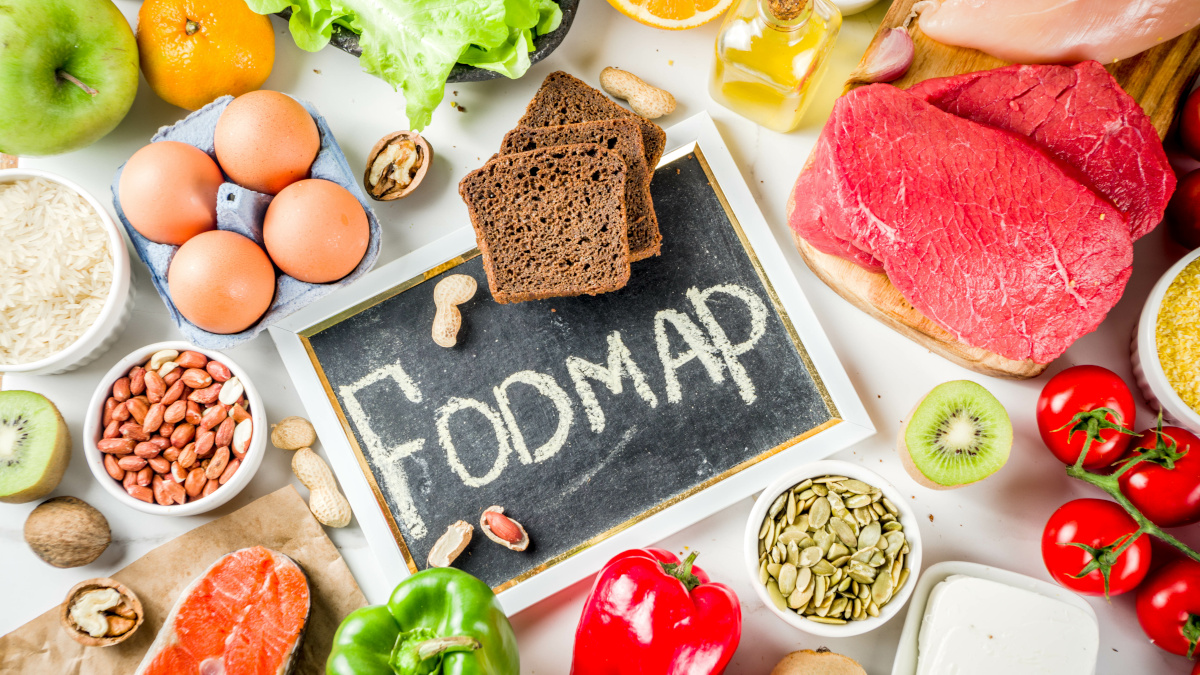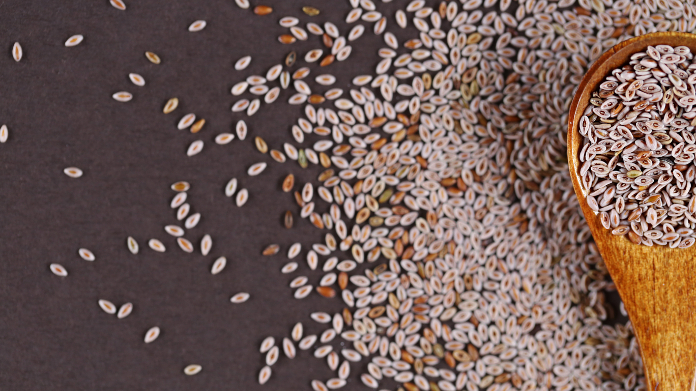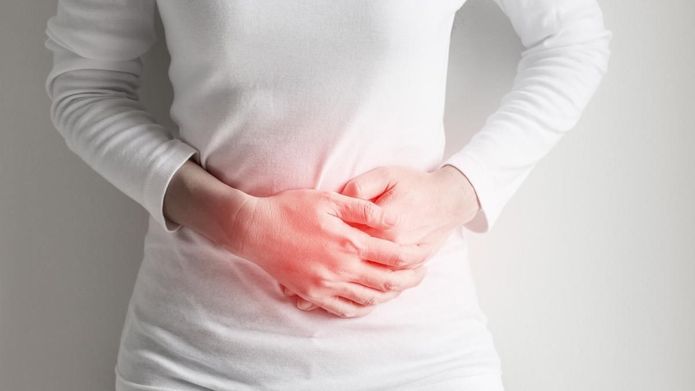Low FODMAP diet: foods to prioritise and those to avoid
Irritable bowel syndrome (IBS) is extremely common. A diet low in fermentable sugars, known as FODMAP, can help relieve symptoms. Discover which foods to prioritise and which to avoid.

Irritable bowel syndrome (IBS): symptoms and causes
A problem of the large intestine, irritable bowel syndrome (IBS) is a functional bowel disorder which affects, on average, 9%-12% of people in the West (1).
Though not serious, IBS can be really troublesome, because of its chronic nature, and of course, its unpleasant symptoms, namely: (2)
- abdominal pain;
- digestive discomfort;
- intestinal transit problems.
Analysis of the symptoms has made it relatively easy to understand the functional mechanisms behind this bowel disorder, which affects twice as men women as men:
- gut motility problems where contractions are either too strong or too weak, causing transit issues;
- micro-inflammation of the intestine associated with abnormal gut flora (the microbiota), causing digestive discomfort and abdominal pain;
- abdominal pain exacerbated by excessive sensitivity to bloating, flatulence, etc.
IBS is usually identified by:
- the onset of pain in the iliac fossa either left or right, on waking or after eating, where the pain is relieved by passing gas or opening the bowels;
- significant bloating causing discomfort, which is relieved by a bowel movement or by passing gas;
- chronic diarrhea, chronic constipation or alternating episodes of both.
Low FODMAP diet: definition
IBS is not a disease (there is no damage to the gut) but rather a functional disorder: it is a dysfunction of the bowel which causes the unpleasant symptoms.
It’s certainly possible, and even common, for IBS sufferers to take so-called ‘lifestyle’ medications to relieve intestinal spasms and restore normal transit, for example. However, the best plan is to modify your diet to try and prevent the bowel dysfunction in the first place.
One diet popular with IBS sufferers is the low FODMAP diet (3). FODMAP is an acronym for Fermentable Oligo-, Di-, Monosaccharides And Polyols.
Fermentable carbs
The low FODMAP diet is primarily based on restricting your intake of foods containing fermentable carbohydrates in order to prevent bloating, flatulence and associated pain.
Oligosaccharides
Oligosaccharides are a group of carbohydrates that include fructans and galacto-oligosaccharides. Poorly absorbed by the gut, they pass through the small intestine to the colon where they have a tendency to ferment.
Disaccharides
The best-known member of the disaccharide family is probably lactose, the milk sugar digested by lactase, a specific enzyme in which many people are deficient.
Monosaccharides
Monosaccharide = fructose. To be properly absorbed by the gut, fructose needs glucose. Excess fructose very often ends up in the colon where it ferments, especially in those suffering from IBS who have a mild intolerance to fructose.
Polyols
Polyols are actually sweeteners used in food manufacture: sorbitol, xylitol, maltitol. They are sugars with a hydroxyl group added to maximise the sweetness. This means less carbohydrate can be used (thus fewer calories) to achieve the same sweet taste.
Foods to prioritise and those to avoid in a Low FODMAP Diet
It’s important to understand that the principle here is not to completely and permanently ban all the foods containing the above-mentioned carbohydrates, but to identify your triggers through a process of elimination.
For the first two to four weeks, you should start by eliminating all sources of FODMAP, to enable your gut to rest and allow relatively normal function to be restored.
Thereafter, over several months, gradually reintroduce certain foods week by week. This allows you to identify precisely which foodstrigger painful and/or troublesome symptoms in you (4-5) :
- fructans : artichoke, asparagus, beetroot, garlic, leek, onion, barley, rye, wheat, cashew nuts, pistachios;
- galacto-oligosaccharides: legumes and pulses in general;
- lactose: all raw milk products or unmatured dairy products. Sheep and goat’s milk contains less lactose. Hard pressed cooked cheeses (such as Comté) are also more digestible. They should be reintroduced slowly;
- fructose : apples, figs, mangos, pears, melon, apricots, blackberries, cherries, lychees, peaches, plums, etc.
Certain vegetables should also be avoided such as any type of cooked cabbage (cauliflower, broccoli, Romanesco broccoli, green or white cabbage, etc), peppers, mushrooms and mangetout.
Conversely, foods that present less risk as part of a FODMAP diet include sprouted seeds, carrots, celery, corn, aubergines, green beans, tomatoes, potatoes, spinach, rice, tofu, bananas, citrus fruit, raspberries, maple syrup, kiwi fruit, and passion fruit. Generally speaking, gluten-free foods (bread, pasta, etc.) can also be consumed as part of a FODMAP diet, as can lactose-free milk and desserts made from it .
Supplements to consider for relieving intestinal discomfort
Natural and effective supplements are available for helping to combat digestive discomfort, a key symptom of IBS but one which also affects many non-IBS sufferers.
Turmeric
An ancient plant used in Ayurvedic and traditional Chinese medicine, turmeric is a spice used in many dishes including curries. Its key health-beneficial compounds are curcuminoids, pigments that support the health of the liver, as well as the respiratory, cardiovascular, nervous and immune systems, and help to maintain healthy skin and appetite. Above all, curcuminoids are good for digestive health (6).
It’s therefore worth considering taking a turmeric supplement with a high curcuminoid content to relieve intestinal discomfort (such as Natural Curcuma, standardized to 95% curcuminoids).
Berberine
Berberine is the active ingredient of a plant also used for thousands of years, both as a spice and as a remedy, in ancient Egypt, the Himalayas and even in Europe: barberry.
Recent studies have shown that berberine supports gastrointestinal health by in particular, promoting glucose metabolism, which plays a part in digestive discomfort and bloating (7).
A course of berberine supplements can thus help combat digestive discomfort (try, for example, the supplement Berberine, a pure extract of barberry, standardized to 97% berberine).
Probiotics
Last but not least, since IBS and digestive discomfort in general can be caused by problems with gut flora, many people choose to take probiotic supplements. These contain bacteria designed to reach the gut microbiota (such as the tailor-made microbiotic supplement Colon Friendly or Full Spectrum Probiotic Formula, which offers a wide variety of active strains) (8).
References
- JONES, Roger et LYDEARD, Susan. Irritable bowel syndrome in the general population. British Medical Journal, 1992, vol. 304, no 6819, p. 87-90.
- CANAVAN, Caroline, WEST, Joe, et CARD, Timothy. The epidemiology of irritable bowel syndrome. Clinical epidemiology, 2014, vol. 6, p. 71.
- HALMOS, Emma P., POWER, Victoria A., SHEPHERD, Susan J., et al.A diet low in FODMAPs reduces symptoms of irritable bowel syndrome. Gastroenterology, 2014, vol. 146, no 1, p. 67-75. e5.
- BARRETT, Jacqueline S. How to institute the low‐FODMAP diet. Journal of gastroenterology and hepatology, 2017, vol. 32, p. 8-10.
- LIS, Dana, AHUJA, Kiran DK, STELLINGWERFF, Trent, et al.Food avoidance in athletes: FODMAP foods on the list. Applied Physiology, Nutrition, and Metabolism, 2016, vol. 41, no 9, p. 1002-1004.
- THAVORN, Kednapa, MAMDANI, Muhammad M., et STRAUS, Sharon E. Efficacy of turmeric in the treatment of digestive disorders: a systematic review and meta-analysis protocol. Systematic reviews, 2014, vol. 3, no 1, p. 1-6.
- ZOU, Kun, LI, Zhao, ZHANG, Yong, et al.Advances in the study of berberine and its derivatives: a focus on anti-inflammatory and anti-tumor effects in the digestive system. Acta Pharmacologica Sinica, 2017, vol. 38, no 2, p. 157-167.
- QUIGLEY, Eamonn MM. Prebiotics and probiotics in digestive health. Clinical Gastroenterology and Hepatology, 2019, vol. 17, no 2, p. 333-344.
2 Days
Order was shipped on time and packaged…Wonderful Jobs!
Order was shipped on time and packaged excellently.
DMHoge
8 Days
great products and prices
great products and prices
Marie
14 Days
Easy to navigate site
Easy to navigate site, had what I was searching for, good price. easy order-check out
James Tucker
20 Days
My skin is clearing up nicely!
Pretty good for my skin so far.
Christian
22 Days
The new packaging is excellent
The new packaging is excellent - finally! No more squashed boxes and torn envelopes.
GORAN
23 Days
Great Product
Great Product
Larry Garrett
28 Days
Quick shipping
Quick shipping; good price. No issues!
Mary McCarty
29 Days
Thr product is very good and is helping…
Thr product is very good and is helping me on my health. Then is always on time
LUGO Luz
32 Days
Buying was fine
Buying was fine. I had problems with the website not recognizing my login info, and had to call to get it fixed. Other than that, everything was good.
David S. Clark
32 Days
Your super maca and super ginseng are…phenomenal
Your super maca and super ginseng are phenomenal supplements that compliment each other when taking them together. Fantastic feeling of well-being and lots of mid day energy without the crash.
Keith Mason
35 Days
I have had amazing results with every…
I have had amazing results with every supplement I've purchased. I am extremely satisfied with this company
kirstin Torres
35 Days
Fine products
Fine products . They are on the leading edge of online supplements. The only issue -so far-is they sometime run out of subscription items.
Jason Argos
37 Days
The ordering process is very user…
The ordering process is very user friendly and the products always come in a timely manner.
CARTER Rhonda
38 Days
The price for Dr
The price for Dr. Pero's AC-11 is reasonable and in line with his views. (my former colleague). Keep it pure.
CAMPBELL Clayton
41 Days
Right on every time.
Right on every time.
Arthur Nicholas




